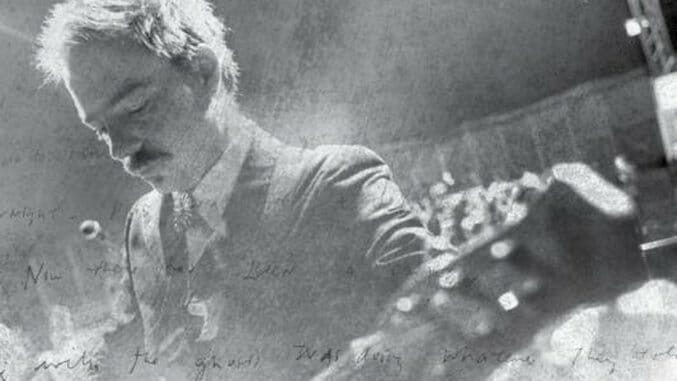The 13 Best Songs by Jason Molina

Erin Osmon’s debut book Jason Molina: Riding with the Ghost came out this week via Rowman & Littlefield publishing. Largely based on new and original interviews with the Ohio musician’s family and friends, the first authorized biography of Jason Molina explores the singer/songwriter’s magnificent musical abilities and the tragic alcohol addiction that halted his creation.
Over the course of his 39 years, Molina was extremely prolific. He released seven LPs and four EPs under the Songs: Ohia moniker, five LPs (which included one box set and one live album) as the Magnolia Electric Co. and three LPs under his own name. His most commercial, Songs: Ohia’s Magnolia Electric Co., even ranks among our Best Indie-Folk Albums and Best Alt-Country Albums lists.
Yet, Molina may be best remembered for the emotion conveyed through his music—the fear and anxiety and sentiment derived from the complexities of human existence. Blending Rust Belt grit with Americana music’s pastoral imagery, Molina’s songs seemed to capture a specific vision of America—musically drawing influence from classic country to ‘80s metal, while lyrically depicting the working class ethos during the Midwest’s most intense period of industrialization. In honor of this new text on his life and work, here are 13 of the best songs by Jason Molina.
13. “Lioness”
Out of survival, a cat’s glance looks purposefully vague. Does it want to maul you or just lick your hand? Jason Molina as Songs: Ohia doesn’t quite know either, and uses that ambiguity to address a similar scenario with a woman, portrayed here as a fierce jungle cat. Sure, she’s gazing at him, but Molina appears to know that close proximity will result in his “heart break…in your jaws.” Still, “you can’t get here fast enough,” he moans over increasingly driven guitar. It’s masochistic of him, but who among us hasn’t run “across the Nile” to get caught in the claws of a doomed romance? —Rachel Brodsky
12. “Such Pretty Eyes For A Snake”
Molina’s narrator is so self-actualized at this point in the game that now he’s also lyrically self-referential (see “Captain Badass”). He figures since he’s already notorious for fucking up, he might as well remain consistent. It’s a half-assed warning to the “snake” and a lazy justification to himself for the actions that will play out through temptation, bolstered by the pair’s implied history. Stylistically, the music pulls and taunts, much like its characters do to each other, with slow, pulse-heavy beats and meandering lead guitar coalescing into ominous, rhythmic grit. Recorded live, the chemistry with the seasoned road lineup is palpable as they create and sustain tension well enough to maintain the nine-minute crawl. A studio cut of the track was never released, but this version is tight enough to get the job done. —Emile Milgrim
11. “When Your Love Has Gone”
This song—sometimes listed as “When Your Love Has Gone” and sometimes as “Journey On”—appears very early in the Songs: Ohia canon and sets the pace for some recurring themes throughout what would become Molina’s extremely prolific output—loss, loneliness, departure and sorrow. It also introduces his recurring perspective of making the most of moments, relationships and time spent with people who will ultimately leave. This is a duality many of us confront at some point—especially in romantic relationships—and it’s difficult to embrace both sides knowingly. “When Your Love Has Gone” provides an early glimpse of the strength and immediacy of Molina’s songwriting, as well. The original arrangement relies heavily on languid space, enabling the lone vocal and guitar to carry enough weight to accurately convey the song’s haunting but hopeful message. —Emile Milgrim
10. “What Comes After The Blues”
For all of Molina’s songs about the blues themselves—how they manifest out of all sorts of toxicity— few question their effects. “What Comes After the Blues,” which appears on the 2007 Magnolia Electric Co. box set Sojourner (not to be confused with the 2003 album of the same name), is surprisingly up-tempo, decidedly alt-country with its softly distorted guitar riff and smooth pedal steel wisps. Molina wrestles with his ambiguous guilt, “You see I nailed my guilt to the back of my eyes / So I see it now before the sun,” before launching into his probing pre-chorus and refrain, “ Now who was I, now who am I? / Lord what have I done? What comes after the blues?” The song never answers those questions, but they’ve inspired others like old pal M.C. Taylor of Hiss Golden Messenger to seek out such a deep cut and play it as tribute. —Hilary Saunders
-

-

-

-

-

-

-

-

-

-

-

-

-

-

-

-

-

-

-

-

-

-

-

-

-

-

-

-

-

-

-

-

-

-

-

-

-

-

-

-








































